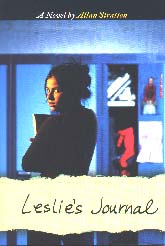|
________________
CM . . . .
Volume VII Number 12 . . . . February 16, 2001
Leslie is out of control. Ever since her father left and moved in with
Brenda, she has become rebellious and argumentative. Daily fights with her
mother have turned her home life into a battlefield. At school, her marks
have plummeted, mainly because she regularly skips her grade 10 classes.
Visits to the vice-principal's office have become a ritual. Her
provocative clothing marks her as promiscuous, much to the derision of her
classmates and teachers. Her attitude and vulgar slurs have alienated her
from her best friend Katie and prim-and-proper Ashley who berates Leslie
at every opportunity.
Enter "terminally cool" Jason McCready, a senior who has just transferred
from a private school. Because Jason's easily the handsomest guy in
school, Leslie becomes infatuated by him. Her reputation, which hides the
fact that she is inexperienced at dating, has made her an easy target. On
their first date, Jason lures her to his home, plies her with drinks and
takes advantage of her. That is the beginning of a whirlwind, abusive
relationship that Leslie is powerless to escape. She soon finds herself
under Jason's control, especially after revealing photographs make her
realize that she was raped during their first date. His obsessive
manipulation of her, his stalking and threats make her fear for her life,
but she has alienated so many people in the past that she feels she has
nowhere to turn for help. "All I know is," she writes, "since falling in
love with Jason I've been the loneliest of all."
On the surface, Leslie is not a likeable character. It is to the credit of
the author that the reader empathizes with her pain, wants to reach out to
her and protect her. Leslie's Journal is comprised entirely of
journal entries, an English class assignment that is intended to allow
students to reflect freely on their personal experiences and will not be
read by the teacher. At first cynical of the assignment, Leslie begins to
open up on paper and reveal her innermost thoughts. These thoughts break
through the faTauade that Leslie has created for herself; they reveal the
turmoil that she is experiencing and the astute observations she makes
about the world around her. excerpt: "Anyway, Ms. Graham was going on about how this was one of her favorite scenes, and if everybody would just settle down and listen they'd really enjoy it. Her face was alive, like she meant it, like it mattered - and all of a sudden I got this flash of why she wanted to be a teacher. She actually cares about this stuff. When I think that, I feel really bad. Caring about something so much it hurts and having everybody else laugh at you --- talk about brutal. I picture Ms. Graham as a teenager with her nose in some book, and the whole school teasing her and being mean. Well, it's thirty years later and nothing has changed. How does she manage to get out of bed in the morning, knowing this is what she's facing? My head filled with this crazy idea that I should stand on my desk and yell at everyone to shut up. Of course I didn't. I'm not suicidal. But I had the idea all the same." (p. 84)
Leslie's Journal is a realistic and thought-provoking glimpse into the mind of a frightened and
desperate teenage girl. The writing style reflects Leslie's thoughts and can, in turn, be
condescending, derogatory, profane and anti-establishment. Teens will relate to her struggle for
independence and her cry for help. This is an exemplary first young adult novel for actor and
playwright Allan Stratton. Like Peg Kehret's I'm Not Who You Think I Am (Dutton
Children's Books, 1999), it fills a gap in the market for books that deal with the dark side of
relationships. It is a story of hope and conviction, and one that could give inner strength to any
reader suffering from similar circumstances.
Recommended.
Carole Marion is the Youth Services Librarian at Calgary Public Library where her responsibilities
include coordinating the system's two annual reading games and author visits for children and
teens. She has been working with youth and their caregivers for over fifteen years.
To comment on this title or this review, send mail to cm@umanitoba.ca.
Copyright © the Manitoba Library Association.
Reproduction for personal use is permitted only if this copyright notice
is maintained. Any other reproduction is prohibited without
permission.
Published by
TABLE OF CONTENTS FOR THIS ISSUE - February 16, 2001.
AUTHORS |
TITLES |
MEDIA REVIEWS |
PROFILES |
BACK ISSUES |
SEARCH |
ORDER |
CMARCHIVE |
HOME
|
